In this week's case discussion from Dr Terry Harvey, this 20x17mm pigmented lesion is present on...
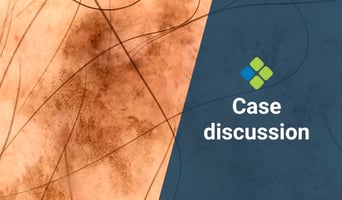
Explore the applications of dermoscopy in diagnosing a range of skin and hair conditions.
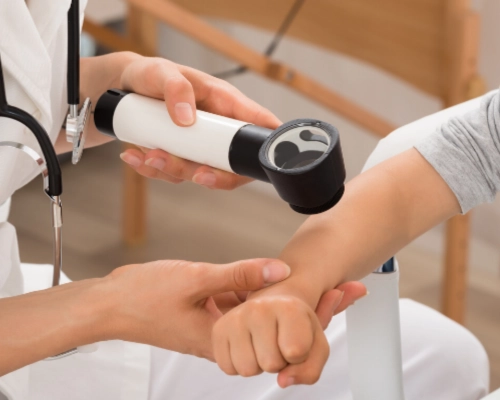
Learn how dermoscopy can be incorporated into the basic practice of dermatology as part of the overall clinical examination (combined with macroscopic inspection, palpation, scratching and diascopy) to reach a more accurate diagnosis.
- Delivered by the world's leading experts in dermoscopy and dermatology.
- This advanced course requires practitioners to have previous exposure to dermoscopy prior to enrolment.
- This course is for medical doctors, International Medical Graduates, registered nurses, and degree-qualified health professionals.
- CPD-accredited and university-assured.
Fulfils 50 hrs for medical professionals in Australia*
100% online
$1995
Special rates available
79.5 hrs
Self-paced
*provided an outcome measurement activity with a minimum of 5 hours is completed.

- Increase your dermatological diagnostic abilities with the help of additional dermatoscopic information.
- Use dermoscopy as a tool to aid the clinical diagnosis of conditions like inflammatory skin diseases, pigmentation, skin infections, hair and nail disorders, and more.
- Better manage skin and hair presentations to improve patient outcomes.
- Track and improve the efficacy of applied treatments.
This module focuses on the use of dermoscopy using these five parameters to guide diagnosis: vessels, scaling, follicular findings, other structures and specific clues. The module looks at the dermoscopy of papulosquamous skin diseases like psoriasis and dermatitis as well as common facial inflammatory skin diseases, including rosacea and discoid lupus erythematosus. It includes dermoscopic findings, pathologic correlation and treatment options. The important morphologic parameters on dermoscopy are evaluated. The module concludes with an explanation of how to diagnose hair and scalp diseases using trichoscopy and supported by illustrations and clinical examples of several hair and scalp skin conditions.
This module looks at the main difference between dermoscopy of inflammatory dermatoses and dermoscopy of skin cancer. The benefits of inflammoscopy are explained and the five parameters to be evaluated (vessels, scaling, follicular findings, other structures and specific clues) are listed. Differentiation between common papulomatosquamous dermatosis is explained and examples of the different conditions are given. The two-step approach for inflammatory dermatoses is given - the collection of clinical data and setting of dermoscopic diagnosis and the incorporation of dermoscopic data. The module concludes with a number of patient cases taking into account the efficacy of the applied treatment by using dermoscopic and photographic examples of several skin conditions.
This module commences with disorders of pigmentation showing an overview of hyperpigmented diseases and examples of these diseases including lichen pigmentosus, frictional melanosis and vitiligo. The differences between hypopigmented and hyperpigmented disorders are outlined. The module continues with diagnosis of granulomatous diseases including numerous clinical examples of diseases such as lupus vulgaris and acne agminate. The final section focusses on two categories of uncommon skin diseases: papulo-keratotic dermatoses and papulo-squamous dermatoses supported by clinical images of the characteristics of these diseases.
This module focusses on the use of dermoscopy to analyse the clinical signs and symptoms for infectious skin diseases. It compares the use of dermatoscopy versus microscopy. Definite diagnosis is usually established by microscopy whereas dermatoscopy allows the "in vivo" recognition of the parasite and its eggs within the burrows and furrows. This module includes descriptions supported by clinical images of louse laying eggs on pubic hair, the scalp or more uncommonly the body. Detailed information is given regarding the use of dermatoscopy for the detection and management of viral and fungal infections of the skin.
This module describes trichoscopy and evaluates the important morphologic parameters of trichoscopy. A comparison is made between dry trichoscopy and trichoscopy with immersion fluid. The appearance of different types of hair shafts and hair follicles are described. This includes criteria to assist with investigations and demonstrates the morphological changes to hair follicles and hair shafts that assist diagnosis of hair problems. Clinical images support module learning. The final section of the module looks at pathological findings including examples of hairpin elongated vessels, arborizing vessels, glomerular vessels and thick arborizing vessels.
At the beginning of this module the different types of common alopecias are listed including first diagnostic steps. Alopecia areata in children is also featured. Androgenetic alopecia is a common form of hair loss in both men and women and this condition is described as well as the major and minor trichoscopy criteria of female pattern hair loss. Clinical images are featured throughout the module. The module further discusses alopecias with examples of androgenetic alopecia including differential diagnosis. In conclusion the management of these conditions is discussed.
This module explains the use of onychoscopy in clinical practice, including the how, where and why of this technique. The technique is discussed as well as management options for treating onycholysis. The diagnostic aspects and symptoms of common inflammatory and infectious disease affecting the nails are described.
The module concludes by outlining what cases of onychoscopy should be used routinely in the evaluation of a nail diseases and how to perform a dermoscopic observation of the nail. Extensive images and examples are provided of the applied treatment on the nails by using trichoscopy.
This module commences with outlining the major forms of melanin and relevance when using dermoscopy. Melanoma facts and a checklist for people with skin of colour are listed. The dermoscopic features of basal cell carcinoma and squamous cell carcinoma are given and illustrated using dermoscopic images throughout to show the different classifications. Attention is also paid to inflammatory dermatoses and pigmentary disorders in people of colour and how to diagnose these conditions. This is supported by numerous clinical examples of different skin conditions. The module concludes with a focus on detecting melasma and ochronosis.
If you're not interested in pursuing a full certificate in this field but simply want to enhance your skills in specific topics covered in this course, you can access the content of this and other courses for a flat fee of $83 per month (paid annually) within HealthCert 365.


Dermatologist-Venereologist, First Department Of Dermatology, Aristotle University, Greece
President, International Dermoscopy Society
Aimilios Lallas is an Associate Professor of Dermatology at the First Department of Dermatology of Aristotle University in Thessaloniki, Greece. He is specialised in skin cancer diagnosis with non-invasive techniques, as well as in the management of skin cancer patients.
His main field of research interest is dermoscopy of skin tumours, the application of the method in general dermatology and the improvement of the management of oncologic patients. He is an author of more than 330 scientific papers published on Pubmed Central, most of them on dermoscopy and skin cancer. He is an editor of eight books and author of several book chapters on dermoscopy. He is a co-investigator in several Phase III Clinical trials on skin cancer treatment. He has been awarded several scholarships and scientific awards.
Over the last years, A/Prof Lallas has established scientific collaboration with numerous colleagues from several countries and has supervised the training of numerous fellows from different countries. He is an invited speaker in several domestic and international congresses and meetings, mainly on dermoscopy and on skin cancer diagnosis and management. He is particularly involved in teaching activities on dermoscopy, having organised and participated in numerous domestic and international courses.
A/Prof Lallas is currently the President of the International Dermoscopy Society.

Specialist in Dermatology and Venereology
Doctor (PhD) in Medicine
Associate Professor at the Department of Dermatology Medical University of Warsaw
Assistant Professor Adriana Rakowska graduated from Bialystok Medical University, Poland in 2001. A/Prof Adriana Rakowska is the author of over 50 scientific journal articles, primarily on trichoscopy and hair and scalp disorders. Her most important achievement has been the development of trichoscopic criteria for female androgenic alopecia and trichotillomania. She is co-editor of the Atlas of Trichoscopy (Springer, 2012).

Assistant Professor, Director, Cutaneous Lymphoma Program, Department of Dermatology, Michigan Medicine, University of Michigan
Director, Teledermatology services, Faculty Associate, Department of Dermatology, Michigan Medicine, University of Michigan
Chief of Dermatology Service, Ann Arbor Veteran Health
Trilokraj Tejasvi is an Assistant Professor, Director, Cutaneous Lymphoma Program, Director, Teledermatology services, Faculty Associate, GLOBAL REACH at Department of Dermatology, Michigan Medicine, University of Michigan, Ann Arbor, USA. He is also Chief of Dermatology Service for the Ann Arbor Veteran Health services.
A/Prof Tejasvi’s main research interest is teledermatology, technology, and imaging of skin, including dermoscopy, confocal microscopy. He has published 52 peer-reviewed journals and publications, including those in Nature Genetics, the Journal of Dermatology, the Journal of Investigative Dermatology, and the American Journal of Human Genetics. He is the current chair of the Teledermatology SIG, American Telemedicine Association, and vice-chair of the Teledermatology Taskforce, American Academy of Dermatology.

First Dermatology Department of the Aristotle University of Thessaloniki
Dr Zoe Apalla was board certified in dermatology in 2008 at the Aristotle University of Thessaloniki, Greece. She was trained in dermatopathology at the St John’s Institute of Dermatology in London in 2010 and obtained her PhD degree at the Aristotle University of Thessaloniki in 2013.
Zoe has worked as a consultant in the First Dermatology Department of the Aristotle University of Thessaloniki since 2010. She oversees the Supportive Oncology Outpatient Clinic and the Skin Cancer Outpatient Clinic, and the department’s dermatopathology laboratory. She also holds General Dermatology and Inflammatory Dermatoses Outpatient Clinics.
Zoe’s main research fields include skin oncology, melanoma and non-melanoma skin cancer, topical treatments, photodynamic therapy and dermatoscopy. She has published more than 100 peer-reviewed scientific articles in international journals and has lectured at many international and national congresses and meetings.

Treasurer of EHRS (European Hair Research Society)
Secretary of the ENS (European Nail Society)
Board Member of IDS (International Dermoscopy Society)
Founding member of International Nail Society
Section Editor of Hair and Nail of DPC (Dermatology Practical and Conceptual)
Dr Michela Starace is a dermatologist and trichologist at the Dermatologic Clinic of Sant’Orsola-Malpighi Hospital, University of Bologna, Italy since March 2012, and Head of Hair and Nail Consultation at the Dermatologic Clinic of Modena Hospital, University of Modena, Italy. She is an assistant in the degree course in Podology and in the degree course in Single Cycle degree / combined bachelor and Master in Medicine and Surgery (Infectious Diseases, Dermatology and Plastic Surgery). Dr Starace is mainly responsible for the Dermatologic Unit of the submission of all the studies to the local Ethic Committee and is responsible for organising the National Alopecia Areata Day in Italy.
Her major research activities include hair and nail biology, paediatric medicine, and mycology. She holds memberships of:
Dr Starace is the author of 100 papers published in international and Italian journals and 20 books chapters. She is also author of the book Le follicoliti superficiali del cuoio capelluto.
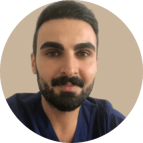
Institute of Dermatology of the University Hospital Santa Maria della Misericordia in Udine (Italy)
His main research area the use of dermoscopy in the diagnosis and monitoring of non-tumoral dermatological diseases. He is author of around 120 papers published in international and national peer-reviewed journals and about 25 book chapters on dermoscopy as well as editor of the book Dermoscopy in General Dermatology (CRC Press). He is Section Editor for Dermatology Practical and Conceptual and Editorial Board Member in the field of Dermoscopy for Dermatology and Therapy. He served as reviewer for more than 40 journals and was awarded as top peer reviewer in 2017, 2018 and 2019 by Publons.

Study at your own pace and to your own schedule.

Easily meet your CPD requirements and gain valuable skills – all in one place for $83 per month.
$1995
.
*provided an outcome measurement activity with a minimum of 5 hours is completed.
Bundle two courses and save 5%, or three courses and save 10% upon enrolment.
Talk to us about deferred payment options, registrar scholarships and special rates.
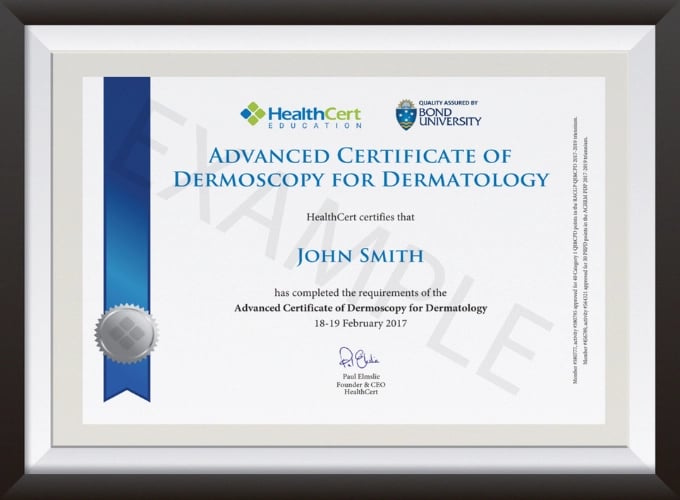

An excellent course introduction to dermoscopy and applying this in clinical practice. Great lectures and supporting materials.
Dr S. Jan
Excellent! This is a great course. The course was clearly presented, with good pictures and course book. All HealthCert's skin cancer courses have been hugely valuable to my practice!
Dr R. Mundell
I highly recommend this course. I increased my knowledge and developed confidence in using dermoscopy in diagnosing skin lesions. Every skin lesion I see means so much more now that it has a name. Great involvement from various experts and great videos and reference materials.
Dr P. Ishri
I really enjoyed the level of learning. It is very rewarding to know that I am potentially saving lives.
Dr K. Laverty
| RACGP Activity Number | ACRRM Activity Number | Activity Title | Education Hours | Performance Hours | Outcome Hours | Total Hours | ||
|---|---|---|---|---|---|---|---|---|
| 491145 | 31295 | Trichoscopy of common alopecias | 491145 | 31295 | 3.5 | 6 | 0 | 9.5 |
| 491153 | 31297 | Dermatoscopy in skin of colour | 491153 | 31297 | 4.5 | 6 | 0 | 10.5 |
| 491128 | 31289 | Basic principles of applying dermoscopy in general dermatology | 491128 | 31289 | 4.5 | 6 | 0 | 10.5 |
| 491137 | 31291 | Disorders of pigmentation, infiltrative dermatoses and uncommon skin diseases | 491137 | 31291 | 4 | 6 | 0 | 10 |
| 491146 | 31296 | Dermatoscopy of inflammatory and infectious diseases of the nails | 491146 | 31296 | 4 | 6 | 0 | 10 |
| 491139 | 31292 | Viral, bacterial, fungal and parasitic infections | 491139 | 31292 | 3.5 | 6 | 0 | 9.5 |
| 491133 | 31290 | Common inflammatory dermatoses of the face and trunk | 491133 | 31290 | 4 | 6 | 0 | 10 |
| 491140 | 31293 | Basic principles of trichoscopy | 491140 | 31293 | 3.5 | 6 | 0 | 9.5 |
| Grand Total | 79.5 | |||||||
View the CPD Hours for all HealthCert Education activities.
Outcome measurement activities are not a requirement of our advanced certificates. You may use an optional HealthCert outcome measurement activity or develop your own.
HealthCert provides several options to meet your outcome measurement hours requirement. These options are self-submitted activities and hours may vary depending on your focus area.
The purpose of outcome measurement activities is to improve your clinical confidence in managing an identified learning gap. The outcome improvement activities are designed to examine current clinical care, align clinical practice with best practice standards and identify opportunities for improvement.
The Advanced Certificate of Dermoscopy for Dermatology is tailored for medical practitioners who wish to perform dermoscopy in primary care to improve diagnosis of commonly seen dermatological conditions.
This course is for general practitioners, degree-qualified nurses and dermal therapists, and other degree-qualified health professionals with an interest in skin. The prerequisite for this Advanced Certificate course is the successful completion of the HealthCert Professional Certificate of General Dermatology or the HealthCert Professional Certificate of Dermoscopy. HealthCert also highly recommends successful completion of at least 25 patient cases prior to enrolment.
The Advanced Certificate of Dermoscopy for Dermatology may be taken as an alternative step after completing the beginner courses in the HealthCert General Dermatology or Dermoscopy pathways mentioned above, after you have gained some basic skills in one or both of those areas. You may elect to take this course because you do not wish to subspecialise in either pathway but want to complete further studies in the field. Or, you may elect to take this course in addition to the full General Dermatology and/or Dermoscopy pathway(s) to round out your knowledge.
Participants do not have to pass an IELTS test but, as the courses are delivered in English, proficiency in listening, reading and writing English is assumed.
Participants will require access to a computer/laptop, an internet connection and a basic level of technology proficiency to access and navigate the online learning portal.
Professionally recognised qualifications and prior studies may be recognised for entry into this course if the learning outcomes match exactly. Please ask a HealthCert Education Advisor for an individual assessment of your prior qualifications and experience.
This certificate course meets the minimum 50 hours CPD annual requirement across all three mandatory CPD activity types, provided an outcome measurement activity with a minimum of five hours is completed. You may use an optional HealthCert outcome measurement activity or develop your own.
Outcome measurement activities are not a requirement of Professional or Advanced Certificates.
Upon successful completion of the course requirements, course participants will receive the certificate of the Advanced Certificate of Dermoscopy for Dermatology, and CPD hours.
This certificate course:
To learn more about the delivery of certificates in Australia and overseas, please visit our FAQs.
Professional Diploma Pathway
You may be interested in the HealthCert three-part Professional Diploma program in Dermoscopy or Professional Diploma program in General Dermatology.
Certified Clinical Attachments Pathway
Optional clinical attachments are available on a 1:1 or small group basis, providing the opportunity to observe dermatological treatments and ask questions of the expert performing the treatments. Clinical attachments are available in Australia and in university teaching hospitals at the University of Lyon and the University of Vienna. HealthCert certificates and university statements are provided for participating in clinical attachments.
Participation in research
HealthCert alumni have opportunities to participate in research projects conducted by leading experts in the field who teach at HealthCert. Past research projects include a study by Monika Janda on the use of teledermoscopy by GPs, the DermaChallenge project by Professor Harald Kittler and his team, and a research study by The University of Sydney exploring the management of patients with melanoma in primary care in Australia. Research projects and surveys are shared via the HealthCert blog which is available to HealthCert alumni.
This organisation is an RACGP-accredited CPD provider under the RACGP CPD Program.
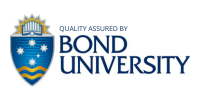

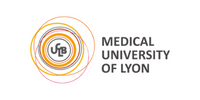
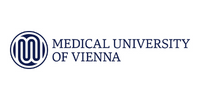

Don't see your question? Explore other faqs or talk to us.
Fees will vary based on the program and study option selected (fully online vs online + optional practical workshop). Payments can be made upfront or in monthly instalments. Special rates and various payment options are available. GP registrars and doctors in training enjoy a scholarship of up to $500. Talk to us to learn more.
Completion of any HealthCert course or attendance at an event will enable you to access the HealthCert Alumni Program which includes:
HealthCert Education is pleased to issue digital credentials for alumni. Digital credentials are a permanent online record of your successful completion of a HealthCert course and are issued to all course participants in addition to PDF certificates. If you are based in Australia, you also have the option to order a hard copy of your digital certificate for a small additional fee.
The recommended study duration of this certificate course is 79.5 hours, which includes study of the pre-course activities and readings, online lectures, live tutorials, and online assessment. This self-paced course offers the flexibility of 100% online study in your own time, at your own pace, in your own home or office, with no mandatory face-to-face requirements. You are not required to be online at specific times but can view and replay video lectures at your convenience.
All HealthCert courses meet World Federation of Medical Education standards. This certificate course qualifies for CPD hours from the Royal Australian College of General Practitioners (RACGP) and the Australian College of Rural and Remote Medicine (ACRRM) in Australia. It is recognised by the Royal New Zealand College of General Practitioners (RNZCGP) in New Zealand. It is recognised by the Hong Kong College of Family Physicians (HKCFP) in China. It is a self-submitted activity in Dubai and the United Kingdom. It is a self-submitted activity through the College of Family Physicians in Canada. If you live or work outside one of the above-mentioned countries, please contact us on admin@healthcert.com to discuss whether this course can be recognised in your country.
Want to stay up-to-date with the latest case studies, podcasts, free video tutorials and medical research articles pertinent to primary care?
Our Education Advisors can assist you with any queries and tailor our education pathway to suit your current expertise, interests and career goals.